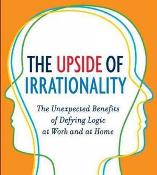The Hidden Forces That Shape Our Decisions
 Ariely, D. (2008). Predictably Irrational: The Hidden Forces That Shape Our Decisions. New York, NY: HarperCollins. (Revised edition 2010)
Ariely, D. (2008). Predictably Irrational: The Hidden Forces That Shape Our Decisions. New York, NY: HarperCollins. (Revised edition 2010)
Ariely, D. (2010). The Upside of Irrationality: The Unexpected Benefits of Defying Logic at Work and at Home. New York, NY: HarperCollins
Read the review by Daniel T. Holt of Mississippi State University, published in Family Business Review:
Many economists and organizational scholars would argue that corporate boards and managers should have objective criteria for evaluating firm performance and deciding between alternative courses of action. Of these, the primary criterion guiding decisions and subsequent actions should be the maximization of the long-term value of the firm. Those of us who study family businesses know, through our empirical work, that this single criterion does not always guide strategic choices. In their influential work, Gomez-Mejia, Haynes, Nunez- Nickel, Jacobson, and Moyano-Fuentes (2007) applied behavioral theory to argue that the controlling families of family enterprises did not focus solely on the maximization of long-term value. Instead, they exercised their authority such that noneconomic goals were pursued to (a) advance family values through the business, (b) preserve the family’s control of the firm, and (c) fulfill family obligations.
Although he has not focused on decision making in family businesses, Dan Ariely has written two recent books—Predictably Irrational and The Upside of Irrationality—that explore the irrational in individual decision making. He concludes, as most of us believe, that individuals are not guided solely by their pursuit of economic goals. As a scholar, I found Ariely’s books relevant for understanding the world of family business and a pleasure to read. Given the focus on individual decision making, they are clearly related to our understanding of marketing and buying decisions. In this review, I will share some thoughts regarding both books.
Click here to continue reading, and follow this link to see the latest issue of Family Business Review.






























































































